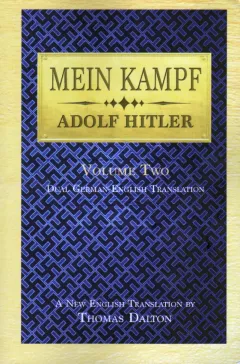Chapter 14, Vol II: Germany's Policy in Eastern Europe Summary
14.1 A source of anxiety to me: The members of our movement are not recruited from those who are indifferent, but rather mostly from among those with very extreme worldviews. [...] It's only natural that their understanding of foreign politics should suffer from prejudice and inadequate knowledge ... However harmful their previous teaching may have been, this was at least partially balanced by a residue of sound and natural instincts. [...] Thus I feel myself obliged to offer to my own colleagues a clear exposition of the most important problem in foreign policy, namely, our relation to Russia.
A folkish state's foreign policy must first of all bear in mind the duty of securing the existence of the race on this planet … by establishing a healthy relation between the number and growth of the population and the quantity and quality of the soil.
14.2 The only healthy condition is one that assures a people's sustenance on their own soil.
I have already explained [in Volume 1, Chapt. 4] that a state's land area is of importance, not only as the source of the nation's food, but also militarity and politically. […] The German nation can assure its own future only as a world power. For nearly 2,000 years, the defense of our national interests was a matter of world history … We ourselves have been witnesses to this: The gigantic struggle of nations from 1914 to 1918 was only the struggle of the German people for their existence on this globe.
In 1914, if there had been a different relation between our area and population, Germany really would have been a world power and … the war would have ended in our favor.
Germany today is no world power. What importance does a State have in which the relation of population to area is so miserable as in the present German Reich? [Our] political Motherland is confined to the laughable area of barely 500,000 square kilometers.
14.3 The British world empire, which owns almost a fourth of the Earth's surface, the American Union, Russia and China … and even France must be ranked among the world powers of today. […] If France continues to develop in the present manner for the next 300 years … [it] would be a formidable, self-contained settlement area from the Rhine to the Congo, filled with an inferior race that gradually emerged through a process of continuous bastardization.
[…]
Never has the relation between area and population in the German Reich been as unfavorable relative to other world states. Formerly we were a young people storming into a world of crumbling great states, whose last giant, Rome, we helped to bring down. Today we find ourselves in a world of great power-states in which our own Reich is constantly sinking into insignificance.
14.4 We must always face this bitter truth clearly and calmly … Germany is no longer a world power, regardless of whether its military strength is strong or weak—thanks to the wholly catastrophic leadership of our people in foreign policy, and to the loss of every sound impulse and instinct for self-preservation.
[…]
[We] must find the courage to organize our national forces and set them on a path that will lead them away from the present restricted living space and toward new land and soil. […] In doing so, [the National Socialist Movement] must bear in mind the fact that we are members of the highest humanity on this Earth, that we have a correspondingly high duty to inspire the German people [to] not only breed good dogs, horses, and cats, but also care for their own blood.
14.5 If we examine the political experiences of our people during more than a thousand years, recalling the innumerable wars and struggles, and scrutinizing it all in the light of present results, we must confess that this sea of blood has produced only three phenomena that we may consider as lasting fruits of specific actions in foreign policy and overall politics:
1) The colonization of the Ostmark, mostly by the Bavarians;
2) The conquest and settlement of the territory east of the Elbe; and
3) The organization of the Brandenburg-Prussian state by the Hohenzollerns, which became the model for the crystallization of a new Reich.
The first two have remained the most enduring. Without them our people would play no role today. […] The third resulted in the German army's instinct of self-preservation and self-defense, which was suited to the modern world. […] The German people became disciplined under the organization of the Prussian army, and in this way recovered some of their long-lost organizational capacity. […] Ten generations of Germans without corrective and educational military training, leaving us to the evil effects of racial, and hence philosophical, division—and our people would lose the last remnant of an independent existence.
[…]
We must take our stand on the highest viewpoint regarding all foreign policy, namely: to bring the land into harmony with our population.The aim of our political conduct must lie in two directions: 1) land and soil as the objecive of our foreign policy, and 2) a new, philosophically established, uniform foundation as the goal of domestic political activity.
14.6 To demand the restoration of the 1914 borders is a political absurdiy … the 1914 Reich borders were anything but logical ... Indeed they were partly the result of chance.
[…]
If we are convinced that the German future calls for the highest sacrifice ... then we must establsh a worthy goal, and fight for it.
The 1914 borders are of no significance for the German future. They neither served to protect us in the past, nor do they offer any strength for the future.
14.7 [W]e National Socialists must stick firmly to our foreign policy goal, that the German people be assured of the land and soil entitled to it on this Earth. And only this action, before God and our German posterity, would justify any sacrifice of blood: because we are sent into this world with the mission to struggle for our daily bread, as creatures to whom nothing is given, and who must be able to win and defend their position as lords of the Earth only through their own intelligence and courage. […] The land on which our German peasants will one day be able to bring forth their sturdy sons justified the investment of our sons today. And even though the responsible statesmen may be persecuted by their contemporaries, posterity will absolve them from all blood guilt for this sacrifice of their people.
Here I must offer the sharpest protest against those folkish pencil-pushers who pretend that such territorial extension would be a 'violation of sacred human rights.' One never knows who stands behind such persons but … the confusion they provoke is desireable and convenient for the enemies of our nation. […] No nation on Earth possesses even a square meter of land by decree of a higher Will or a higher Right.
[…]
State borders are made by man, and can be changed by man. […] If the German people are imprisoned within an impossible area, and face a miserable future, this is not by the command of Fate, anymore than to oppose such affairs is to disobey it. Just as no higher power has promised more territory to other nations than to the German, so it cannot be blamed for an unjust distribution of soil. [T]he soil on which we now live … had to be conquered by mortal risk—so too in the future.
Today we're all convinced of the need to reckon with France, but this would be broadly ineffective if it were the sole aim of our foreign policy. It will have significance only if it serves in the struggle for an enlargement of our people's living space in Europe. Colonial acquisitions won't solve that problem. This will happen only by the winning of settlement territory such as will extend the area of the Motherland … in a unified expanse.
The folkish movement mustn't be an advocate for other nations, but rather a protagonist for itself. […] The old German policy was unjustly determined by dynastic considerations; future policy must not follow this sentimentality. We must especially not be security police for the well-known 'poor, small nations,' but rather soldiers of ourselves.
We must go still further: The right to land and soil becomes a duty when a great nation seems destined to go under, unless its land is extended. … Germany will either be a world power, or not at all.
14.8 Therefore we National Socialists have purposely drawn a line through our pre-war conduct of foreign policy. We resume where we left off six centuries ago. We shut off the colonial and trade policy of pre-war times, and pass over to the land policy of the future.
[...]
Destiny itself seems to wish to point the way for us here. In delivering Russia over to Bolshevism, it robbed the Russian people of that intelligentsia that had once created and secured the Russian state. [That] was not a result of Russian Slavic political ability, but rather was a marvelous example of the state-building capacity of the Germanic element amidst an inferior race.
Many powerful empires were created on the earth in this way. .. For centuries, Russia owed its sustenance to the Germanic nucleus of its ruling upper class.
Today this class has been almost completely rooted out (ausgerottet) and extinguished (ausgelöscht). The Jew has taken its place. … He himself is no organizing element, but rather a ferment of decomposition. This colossal Eastern Empire is ripe for dissolution. And the end of Jewish rule in Russia will also be the end of Russia as a state. We are chosen by Fate to be witnesses of a catastrophe that will afford the strongest confirmation of the folkish race-theory.
Our task … is to develop the political insight in our people that will enable them to realize that their future aim … [lies in] the industrious labor of the German plow, for which the sword will provide the soil.
End of Part One. Part Two (14.9 to 14.16) coming soon.
- Printer-friendly version
- 611 views





